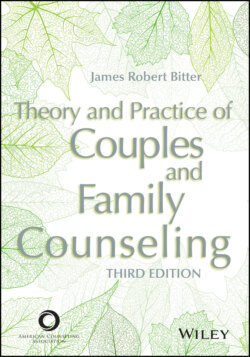Читать книгу Theory and Practice of Couples and Family Counseling - James Robert Bitter - Страница 90
Systemic Perspectives
ОглавлениеPerhaps the most fully developed individual and systemic positions on virtue come from Adler (1927/1957, 1933/1938). Adler posited that the nature of human beings was to be connected to and in relationship with others. He called the capacity for such connectedness a community feeling (Gemeinschaftsgefühl). The enactment of a community feeling was characterized by the taking of an active social interest in the wellness of others. Not only was this the basis for virtue, but by extension it was also the basis for individual and family mental health.
Heinz Ansbacher (1992) addressed and clarified community feeling and social interest, noting that a community feeling is related to the feeling of being in harmony with the universe and with the development of life throughout time. He called social interest “the action-line of the community feeling” (p. 405): the practical implementation of an interest in the well-being of others. To Ansbacher’s description of social interest we would add the following traits found in the writings of many Adlerians: cooperation, contribution, caring, connectedness, courage, confidence, and competence (what might be called the 7 Cs).
McGoldrick (2016) spoke to this community feeling when she suggested that
we human beings need to appreciate that we are all connected to each other and to the earth, to the past and the future of each other and our planet. So making the best choices means aiming towards positive connectedness with family, friends, community, coworkers, and nature that surround us. (p. 2)
Although Adler may have had the most developed perspective on what constitutes a good life, he was not the only systemic thinker to contribute to this discussion. Other family therapists have developed models that directly or indirectly suggest a diversity of values, virtues, and qualities of a good life.
Kerr and Bowen (1988) highly valued rational thought and placed it in opposition to emotional reactivity, but the true test of a differentiated self was the ability to stay calm and observant in the midst of often emotionally charged personal family systems. It was in elevating one’s rational responsiveness that whole systems had a chance to change (Kerr, 2019).
Satir (1964/1983) wrestled with the same concerns for the individual in relation to the system. For her, however, the answer was not in rational thought but in emotional honesty communicated congruently in the present moment. The mark of maturity could be seen in “one, who having attained his [sic] majority, is able to make choices and decisions based on accurate perceptions about self, others, and the context . . . ; who acknowledges these choices and decisions . . . ; and who accepts responsibility for their outcomes” (p. 118).
One of the virtues that emanates from the work of both Bowen and Satir is the value of clarity of both mind and heart. Both masters knew that such clarity came from reflection and from a refusal to act based on automatic reactions. Although Whitaker (1976) appeared to value spontaneity of experience over all else, including reflection, in practice his interventions were designed to do many of the same things that Bowen and Satir valued: (a) release the family from self-imposed constrictions; (b) augment freedom of movement and expression; and (c) help family members find a balance between individuation and connectedness, dependence and independence, and personal needs and family requirements.
Similar dialectical themes are reflected in the structural work of Salvador Mi-nuchin (1974, 2004) and most of the strategic therapists. In these models, a diversity of resources and cultures is valued over limited perspectives and options; order and boundaries facilitate openness and freedom, including the right of an individual or system to close down periodically; the individual and the system are structurally and developmentally interdependent; flexibility and adaptability are valued over rigidity; and leadership is better when it is balanced and seeks harmony. To these values, Adlerians, Satir, solution-focused therapists, social constructionists, and feminist therapists would add the value of social equality and the importance of collaboration. Feminists would further note that the valuing of the right, just, or principled action might be the valuing of an illusion: Relational morality calls on all of us to care for others as well as ourselves (Brown, 2018; Gilligan, 1982). Feminist research echoes Adler’s call for community feeling and social interest.
Both the global village and systems orientations reframe individual virtue within communal contexts. Quality connections with others are increasingly valued over individual, even heroic, action—although the goal is always for both the individual and the system to grow and develop. In this sense, words like “caring,” “clarity,” “cooperation,” “courage,” “confidence,” and “competence” take on a relational focus. Freedom for the individual is balanced with the survival needs and development of the whole. Individual capacities are contextualized as one set of resources among many that may be available to the group, the family, or the relationship. Difference and diversity are valued over sameness and routine. This valuing and appreciation of multiple perspectives (Lee, 2019; Pinsof et al., 2018) is key to reshaping what constitutes virtue in an increasingly intimate world with diverse and interdependent cultures.
